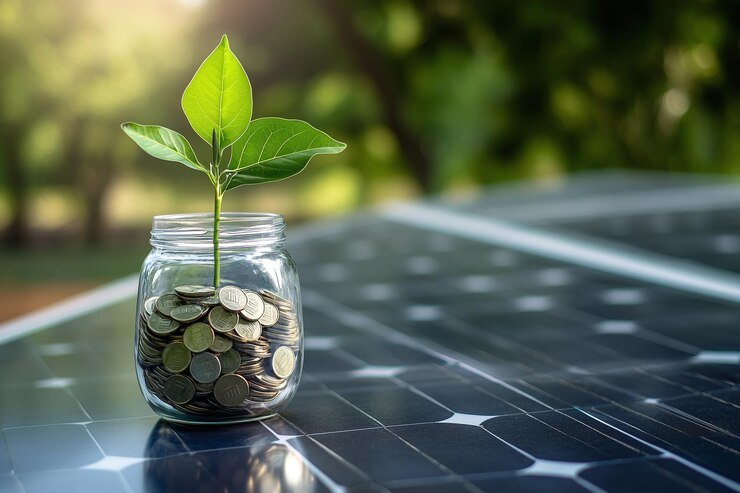Solar Panels vs Electricity Bills Savings in 2024: How Much Can You Save?: How Much Can You Save?

Solar Panels vs Electricity Bills Savings in 2024: How Much Can You Save?
Table of Contents
ToggleSolar Panels vs Electricity Bills Savings in 2024: How Much Can You Save?
In 2024, as energy costs continue to rise, more and more households are turning to solar energy to reduce their electricity bills. With increasing awareness about the long-term benefits of solar panels, homeowners are looking for sustainable and cost-effective ways to power their homes. But how much can you actually save by installing solar panels, and how do they stack up against traditional electricity costs? In this article, we’ll explore the potential savings of solar panels in 2024, taking into account government incentives, electricity prices, and solar panel system costs.
The Basics of Solar Panel Savings
Solar panels work by converting sunlight into electricity, reducing reliance on grid electricity from utility companies. This renewable energy source not only reduces carbon emissions but also helps homeowners cut their monthly energy expenses. Once solar panels are installed, they can generate free electricity for decades, leading to significant long-term savings.
Rising Energy Prices and Inflation
With inflation impacting energy prices globally, electricity bills have been steadily increasing. In 2024, traditional energy sources are expected to become even more expensive due to supply constraints and environmental regulations. Solar energy offers a hedge against these rising costs by providing a stable, renewable energy source that protects homeowners from fluctuating electricity rates.
Solar Savings Over Time
The savings from solar panels accumulate over time. As electricity rates increase, the savings from solar become more substantial. The initial investment may seem high, but homeowners can expect to save thousands of dollars over the lifespan of their solar panel system. In many cases, solar panels pay for themselves within a few years.
Solar Panel Savings in 2024
In 2024, solar energy continues to be a cost-effective solution for homeowners looking to lower their electricity bills. By switching to solar, you can significantly reduce or even eliminate your monthly electricity expenses.
Case Studies: Average Household Savings
For an average household in the U.S., the installation of a solar panel system can lead to savings of around $1,000 to $2,000 annually, depending on the location and energy consumption. Over 20 years, these savings could amount to $20,000 or more. The exact savings will vary by state, as electricity rates and solar incentives differ across regions.
Solar Savings Calculator for 2024
To get a more accurate estimate of how much you can save, many homeowners use solar savings calculators. These tools take into account your location, electricity usage, and the size of your solar panel system to give you an estimate of potential savings. By entering your electricity bill data into a calculator, you can easily see how much you stand to save by going solar in 2024.
Solar Panels Return on Investment (ROI)
One of the most important factors to consider when evaluating solar panels is the return on investment (ROI). The payback period for solar panels—the time it takes for your savings to cover the cost of installation—typically ranges from 5 to 10 years, depending on the system size and local incentives.
Government Incentives, Rebates, and Tax Credits
In 2024, there are several government programs available to help reduce the upfront cost of solar panels. The federal solar tax credit allows homeowners to deduct a portion of the cost of installing solar panels from their taxes. Additionally, many states offer rebates and incentives that can further decrease the cost, boosting your ROI and shortening the payback period.
Long-Term Savings
After the initial payback period, homeowners can continue to enjoy free or nearly free electricity for decades. Solar panels typically last 25 to 30 years, so the long-term savings are significant. In some cases, solar energy can reduce electricity bills by 80% or more, depending on system efficiency and energy consumption patterns.
Reducing Electricity Bills with Solar
To maximize your electricity bill savings with solar, it’s important to choose the right system for your home and use energy-efficient appliances. By optimizing energy use and pairing solar panels with other technologies, like solar batteries, you can further reduce costs.
Energy-Efficient Appliances and Solar Batteries
Energy-efficient appliances consume less electricity, allowing you to stretch the power generated by your solar panels. Solar batteries store excess energy generated during the day for use at night or during periods of low sunlight, reducing the need to draw electricity from the grid.
Choosing the Right Solar System
The size of your solar system will impact the amount of electricity it generates and, consequently, the savings you achieve. It’s important to work with a professional installer to determine the optimal system size based on your home’s energy needs and roof size.
Factors Influencing Solar Savings
Several factors affect how much you can save with solar panels, including your location, the amount of sunlight your home receives, and the quality of the solar panels you install.
Location and Sunlight Hours
Homes in regions with abundant sunlight, such as California and Arizona, tend to see higher savings because solar panels produce more electricity in sunny climates. However, even in less sunny areas, solar panels can still significantly reduce electricity bills.
Roof Orientation and Panel Quality
A south-facing roof with minimal shading is ideal for solar panels. However, advances in technology mean that solar panels can be effective on most roof types. High-quality solar panels with better efficiency ratings will produce more electricity, leading to greater savings.
Maintenance and Cleaning
Regular maintenance and cleaning of solar panels ensure that they operate at peak efficiency. Dust, dirt, and debris can reduce panel performance, so it’s essential to keep them clean. Proper maintenance can maximize your savings and prolong the lifespan of your solar system.
State-Specific Incentives and Programs
Each state offers different incentives and programs for solar energy. Some states provide rebates, grants, or performance-based incentives, which can make solar panels even more affordable. Check your state’s specific programs to see how they can enhance your savings in 2024.
Conclusion: Is Solar Worth It in 2024?
In 2024, solar panels offer a compelling solution for homeowners looking to reduce their electricity bills. With rising energy costs, government incentives, and the long-term savings potential, solar energy is a smart investment. Whether you’re aiming to cut costs, reduce your environmental impact, or achieve energy independence, solar panels provide a clear path to substantial savings.
If you’re ready to explore how much you can save with solar panels, use our free solar savings calculator to get a personalized estimate for your home.
FAQ:
1. How much will solar panels reduce my electricity bill in 2024?
Solar panels can reduce your electricity bill by 50% to 80% depending on your energy consumption, location, and the size of the solar system. In some cases, they can eliminate your electricity bill entirely.
2. How long does it take to recoup solar panel costs?
On average, it takes 5 to 10 years to recoup the cost of solar panels through energy savings. This varies depending on government incentives, the size of your system, and local electricity rates.
3. Are solar panels worth it in 2024?
Yes, solar panels are a valuable investment in 2024, especially with rising electricity costs and government incentives that reduce installation expenses. Over time, solar panels offer significant savings on electricity bills.
4. How do solar panels affect property value?
Solar panels typically increase the value of a property by reducing future energy costs for the homeowner. Homes with solar systems are often sold at a premium compared to those without.
5. Do I need a solar battery to save on electricity bills?
While solar batteries aren’t necessary to save on electricity bills, they allow you to store excess solar energy for use during the night or power outages, maximizing your energy independence and further reducing reliance on the grid.
6. Can solar panels work in cloudy or rainy regions?
Yes, solar panels can still generate electricity in cloudy or rainy conditions, though they may produce less energy than on sunny days. Solar systems in these regions can still result in significant savings, especially with efficient panels.
7. What incentives are available for solar panels in 2024?
In 2024, homeowners can benefit from federal solar tax credits, state-specific rebates, and various incentives to help offset the cost of solar panel installation.
Why You Need to Read These Blog
How to Calculate Occupancy of a Charter Business: Formula, Methods, and Strategies
Identifying Business-Related GIS Applications in Australia
Best Practices for Project Managing 3rd-Party Developers
How to Use Captions to Increase Video Watch Time on Social Media
How to Use YouTube Shorts to Capture Mobile-First Audiences
How Explainer Videos Can Enhance Your Content Marketing Strategy
Level 2 Business-IT Maturity Model
Workato Business Intelligence Analyst Intern
How Long Has Impressive Flooring Been in Business?
Top 20 Digital Business Transformation Companies in 2024
The Top 10 Most Expensive Cars in the World
Unveiling Houdini 20.5: Features, Tutorials, and Applications
Best Budget Smartphones for 2024: Top Picks for Every Need






